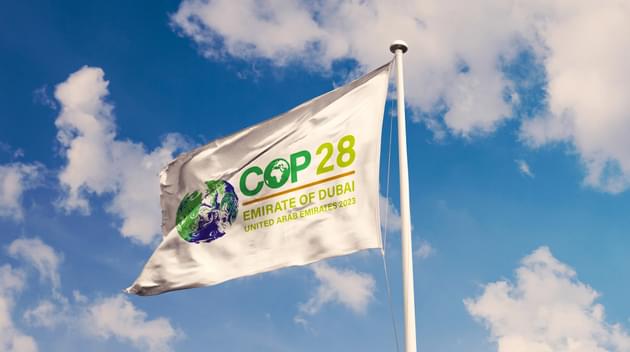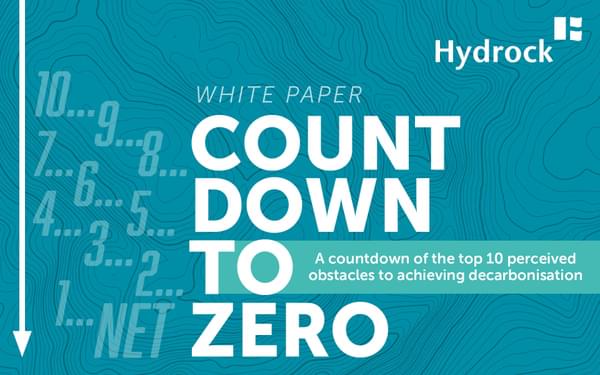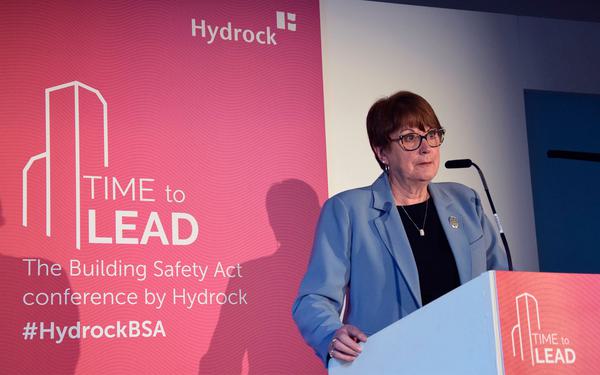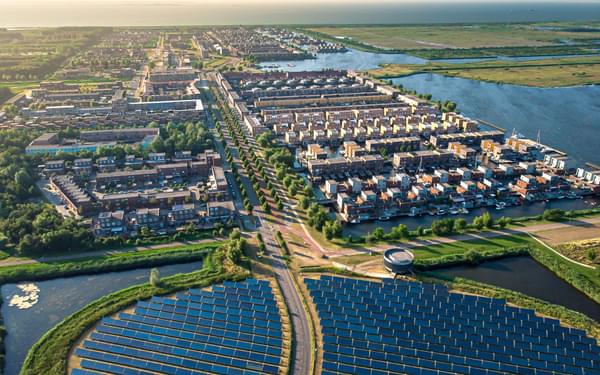
A critical 'global stock-take' is happening right now in Dubai at COP28.
Whilst controversy swirls around the choice of host nation for this all-important summit, the agenda includes a comprehensive assessment of all climate action to date to inform each country's next round of climate goals, and big decisions have already been made with respect to financing the loss and damage fund.
Graham Munday, our energy and environment marketing director, spoke to people across Hydrock to get their views on what really matters from a truly global and macro event aimed at addressing the march of climate change. Opinions centred around four areas, with the location a key point of debate.
Host location — challenge and opportunity
The decision to host COP28 in Dubai, UAE has raised significant concerns among climate campaigners due to the UAE's status as one of the world's largest oil producers.
Dr Sultan Ahmed Al Jaber is of course both president of the summit and CEO of the UAE's Abu Dhabi National Oil Company. It can be argued that including the fossil fuel industry in these negotiations is essential and that Al Jaber's position may uniquely position him to galvanise the oil and gas industry into climate action. The other side of that coin is that instead of nations leading the conversations, this could indicate to corporates having more sway.
However, headlines on the eve of the event that the UAE planned to use its role to strike oil and gas deals [1] hasn't helped the optics.
The location of COP28 presents both challenges and opportunities. The controversy surrounding the location might cast a shadow over the summit's objectives, but it also brings a unique perspective by involving a major oil-producing nation in the conversation about transitioning away from fossil fuels.
Rebalance the subsidies
Can this COP secure agreement to redress the enormous subsidies that the oil and gas sector receive? It would be truly transformational if agreement was made in the UAE of all places. A real statement.
Fossil fuel subsidies were $7 trillion in 2022, having risen by $2 trillion since 2020 [2]. Research by the Liberal Democrat party in the UK revealed that the UK government has given £20bn more in support to fossil fuel producers than those in renewables since 2015, and there has been significant extra support for new extraction and mining in the 2020s [3]. Signals from the US indicate times may change. President Biden proposed a budget in March 2023 that would scrap billions of dollars in oil and gas subsidies [4].
There is no dispute that, right now, we still rely on fossil fuels. Plans are in place to transition away from these polluting fuels, in favour of an integrated clean energy solution and achieve net zero — the problem is they aren't being implemented effectively. Most economies are either drifting to low performance or simply achieving success in areas where success was easy. The result is that all indicators suggest our Nationally Determined Contributions (NDCs) will push us past a 2°C rise in global warming [5].
On the positive side, we've reached a place where the development of renewable energy power generation can be undertaken without incentives, and it's cheaper to build these new renewable power plants than continue to operate existing fossil fuel-driven power stations. However, we've no chance of limiting global warming to 1.5°C if we keep investing in new oil and gas exploration.
The playing field is levelling. It's very positive that the power generation industry is able to move away from the need for subsidies and incentives to invest in renewables, and can make a case for it being as competitive as coal and gas. This will mean that the smart money will follow.
The incentive to change is still the challenge. The cost of carbon remains far too low, and there are political and social factors also limiting change. We have access to the technology and tools to achieve the 1.5°C target, but we're using a 'tragedy of commons' mentality to deal with climate change.
Business is driven by maximising production to increase economic gains, and individual businesses are incentivised to produce more and more, often without considering the environmental cost, which results in greater emissions. The repercussions are not felt equally. The atmosphere acts as 'common' territory — a shared resource where the 'tragedy' unfolds, while each entity maximises their own good at the expense of the collective. The lack of immediate consequences for individual polluters leads to collective failure to address the broader, long-term impacts of climate change.
The uncomfortable truth for those who have influence at COP28 is that the dial needs to change on subsidies, the price of carbon and how we perceive and manage shared environmental resources.
Education on adapting to climate change to minimise displacement
When France's most famous champagne houses are buying land in Kent to plant vines because their traditional locations have become too hot for these delicate varieties, you should know something is up [6].
Population growth, coastal erosion, ever hotter and wetter places. The concern is that this only leads one way. Displacement. The Institute for Economics & Peace stated in 2020 that 1.2 billion people could be displaced globally by 2050 as a result of natural disasters relating to climate change [7].
This is a thorny subject, so we'll keep it light touch here, but global collaboration to address resource scarcity, promote fair trade practices, and establish mechanisms to resolve disputes peacefully are critical requirements from a joining of nations at any COP.
It's moments like COP28 when the 17 agreed UN Sustainable Development Goals arguably feel more pertinent than ever. Action needs to be centred around limiting the continued impacts of climate change, as well as investing in adapting societies to cope with what we have and are likely to experience more of. The pledges made to the 'loss and damage' fund within hours of COP28 kicking off is a move in the right direction — critical funds to help nations deal with climate disasters [8].
Across the world, we need to better educate on the opportunities to engage in how to adapt our societies to be more resilient to climate change. Our children are climate anxious, so we need to change the conversation so that the facts are understood, but equally the opportunity to innovate, invest and drive change that will improve lives and our environment can be seized by anyone and everyone.
Put industry under a bigger spotlight
Whilst it's very laudable that more of us are diligently separating our waste at home, and there's clearly been more focus on what organisations are doing about their respective impacts, we're inching along in the supposed 'decade to deliver' [net zero]. We need to turbo-charge in the areas where the greatest positive changes can be made.
Much of this debate circles back to subsidies, the price of carbon, and collective global collaboration as detailed above. However, in a UK-context, if we look at how (finally) the construction sector is having to adapt to strict legislation around safety and responsibility through the Building Safety Act [9] with its clear objectives, then a template for delivering change around environmental responsibilities emerges.
Controversial view, but should the price of non-disclosure, or poor environmental performance be much tougher, genuinely hurting businesses so that change is made much quicker. The UK' Energy Savings Opportunities Scheme (ESOS) is a great initiative for helping organisations to complete an energy audit and set them on a decarbonisation pathway. But there are no fines for failing to improve performance between the four-year cycle of audits, only fines for failing to complete the audit! In addition, schemes such as ESOS capture 'large' businesses but arguably should be widened as there will be many SMEs with energy intensive operations who are not picked up under this scheme.
Positively, the UK government has streamlined planning rules to enable onshore wind projects supported by local communities to be approved and implemented more quickly [10]. Extraordinarily, only six turbines had begun operation in England sine 2020. However, a recent Construction News report suggests that the new regulations leave room for different interpretations, with RenewableUK claiming that onshore wind still faces restrictions that no other form of infrastructure faces [11].
What is needed is strong and clear regulation, a public strategy focused on clear mission statements, and engaging both public and business by massively supporting green jobs, community initiatives, and innovation.
Let's turn debate into action
COP28 will of course deliver both a hugely serious debate and a triumphant spectacle of what has been achieved and will be achieved.
However, on Day 2, King Charles III has outlined very clearly what needs to happen whilst delivering a telling statement: "We remain so dreadfully far off track."
It's a view backed up the thoughts of colleagues across Hydrock. The time for environmentally-positive statements has passed. What we need is to implement what has been discussed in previous COPs. We need to hold government, institutions and organisations to greater account. Just meeting and talking about it won't solve the problem.
With thanks for their contributions to: Maria Niebla, Josh Giddings, Craig Anderson, Rob Bracewell and Marcos DeCastro.
References:
[1]: https://www.bbc.co.uk/news/science-environment-67508331
[2]: https://www.imf.org/en/Topics/climate-change/energy-subsidies
[5]: The CAT Thermometer | Climate Action Tracker
[6]: https://www.delish.com/uk/cocktails-drinks/a42863037/taittinger-pommery-english-vineyards/
[9]: https://www.hydrock.com/topics/the-building-safety-act-time-to-lead
[10]: https://www.gov.uk/government/news/local-areas-supported-to-progress-onshore-windfarms














